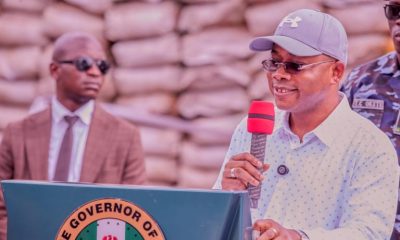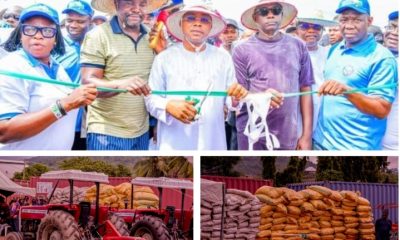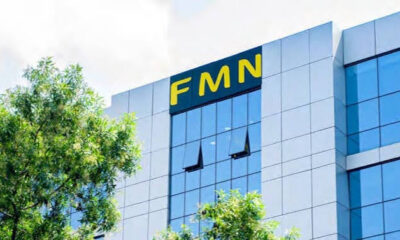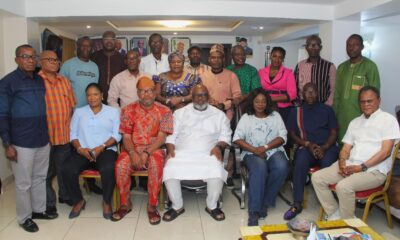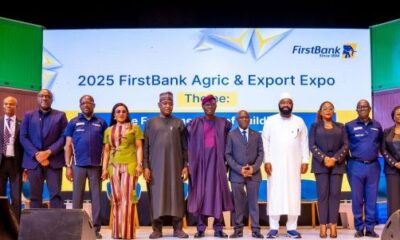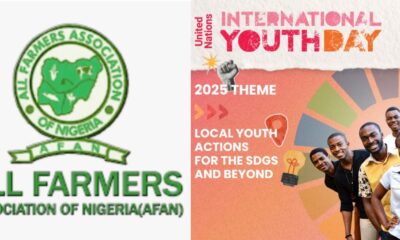By Ezurike Ugochukwu
Nigerian, despite having the land and labor to produce staples locally spends over $10 billion annually on food imports as made known by the Minister of Agriculture and Food Security, Abubakar Kyari.
Kari while speaking at the 2025 First Bank Agric & Export Expo in Lagos, themed “Fundamentals of Building a Non-Oil Export-Driven Economy.” decried the situation where Nigeria, blessed with over 85 million hectares of arable land, an energetic young population, and a market, poses a clear contradiction to why it cannot feed itself.
The Honourable minister who was represented at the event by his Special Adviser on Technical Affairs, Engr. Ibrahim Akali, said the trend is a clear paradox as the country must rise to confront this unpalatable situation.
 He revealed, “Agriculture already contributes 25 percent to GDP and employs 35 percent of the workforce, with 85 million hectares of arable land and a youth population where 70 percent are under 30,” the minister said. “Yet, Nigeria accounts for less than 0.5 percent of global agricultural exports.”
He revealed, “Agriculture already contributes 25 percent to GDP and employs 35 percent of the workforce, with 85 million hectares of arable land and a youth population where 70 percent are under 30,” the minister said. “Yet, Nigeria accounts for less than 0.5 percent of global agricultural exports.”
Food sovereignty, the minister said, must be Nigeria’s objective, allowing the country to produce its own food, free from the uncertainties of imports and global market fluctuations.
“The contradiction is clear: we have the land, the labour, and the markets. What we lack are the financing systems, value addition, and infrastructure that convert potential into prosperity,” Kyari declared.
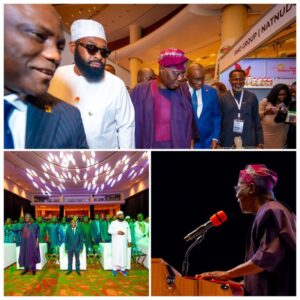 Kyari submitted that the real challenge is not the absence of resources, but the absence of finance structures that work for farmers. He criticized conventional credit systems that “subjugate rather than support farmers,” and called for new mechanisms such as revenue-sharing finance, agricultural boards with performance triggers, factoring forward contracts, pay-as-you-harvest schemes, and equity-based models.
Kyari submitted that the real challenge is not the absence of resources, but the absence of finance structures that work for farmers. He criticized conventional credit systems that “subjugate rather than support farmers,” and called for new mechanisms such as revenue-sharing finance, agricultural boards with performance triggers, factoring forward contracts, pay-as-you-harvest schemes, and equity-based models.
“Across the world, innovative financing has transformed agriculture from subsistence to surplus. Nigeria can do the same if we begin to think critically,” he said.
Citing global examples, he noted that Vietnam’s coffee exports surpass $4 billion annually, Ghana’s cocoa exports top $2 billion, while Nigeria’s exports trail behind at less than $400 million, despite having similar potential.
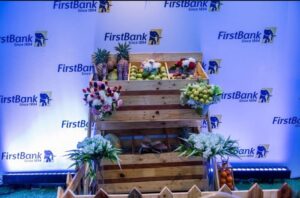 “These uncomfortable comparisons remind us that Nigeria can and must do more,” he said.
“These uncomfortable comparisons remind us that Nigeria can and must do more,” he said.
Kyari also spotlighted weak infrastructure and poor quality control as major obstacles to Nigeria’s export drive. He noted that transporting a container from Kano to Lagos often costs more than shipping the same container from Lagos to Europe, while congested ports and weak certification systems result in repeated rejection of Nigerian goods abroad.
To tackle these issues, the ministry has conducted a study on food haulage systems aimed at reducing post-harvest losses and is working with other ministries to revamp transport and certification frameworks.
“Infrastructure is not just about roads and ports. It is about efficiency in every step of the supply chain. Volumes are important, but volume without quality will fail,” Kyari warned.
He called for a zero-reject policy, stressing that every bag of sesame, carton of catfish, and ton of cocoa must meet internationally accepted standards.
“With stronger laboratories, functional certification systems, and farmer training, we can ensure our exports consistently meet global requirements and avoid costly rejection,” the minister added.
Kyari concluded that the era of dependence on oil rents is over, and Nigeria must pivot to resilience through agriculture and exports.
 “Oil once gave us a cushion, but it also bred complacency. The fundamentals now compel us to move from dependence on oil to resilience in food and export earnings,” he said.
“Oil once gave us a cushion, but it also bred complacency. The fundamentals now compel us to move from dependence on oil to resilience in food and export earnings,” he said.
Chief Executive Officer/Managing Director of FirstBank Group, Olusegun Alebiosu, described the Agric & Export Expo as a platform for collaboration, innovation, and sustainable growth.
According to him, the forum provides an opportunity to chart a path that secures Nigeria’s future prosperity while positioning the country as a competitive force in the global marketplace.
The Expo featured two key sessions — a plenary session, which offered a strategic overview of pathways to accelerate growth in agribusiness and non-oil exports led by both policymakers and private sector leaders; and a technical session, which brought together industry experts to discuss practical strategies for repositioning these sectors as core drivers of economic growth.
 Alebiosu explained that the sessions were designed to spark robust dialogue, share tested approaches, and generate actionable insights capable of advancing Nigeria’s non-oil economy.
Alebiosu explained that the sessions were designed to spark robust dialogue, share tested approaches, and generate actionable insights capable of advancing Nigeria’s non-oil economy.
Highlighting FirstBank’s long-standing involvement in agriculture and non-oil sectors, he noted that the bank has, for more than a century, played a defining role in financing industries vital to Nigeria’s development and to the broader sub-Saharan African economy.
“Today, agriculture—once overlooked—has taken its rightful place at the heart of our national development agenda,” he said, commending the Federal Government’s commitment to the sector while reaffirming FirstBank’s role as a steadfast partner in the journey.
He added that the bank’s portfolio cuts across the entire agribusiness value chain, from primary production to processing and export. Across Nigeria, dedicated teams provide tailored, sector-focused financial solutions to support agricultural and solid minerals enterprises, ensuring they have the resources to thrive and compete globally.
According to him, the decision to rename the event as the FirstBank Agric & Export Expo underscores the bank’s renewed and unwavering commitment to making non-oil exports a transformative force in Nigeria’s economy.
By fostering collaboration, driving innovation, and promoting strategic investments, Alebiosu said, Nigeria can unlock the full potential of its agricultural value chain and open new pathways to shared prosperity.
He expressed optimism that the partnerships and commitments shaped at the Expo would lay the foundation for a new era of growth — not just for Nigeria, but for Africa as a whole.
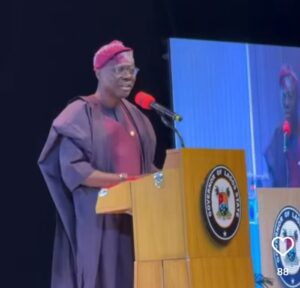
On his own part, the Lagos State Governor, Babajide Sanwo-Olu assured that the state government will continue to make significant investments in infrastructure to link farms to markets and strengthen Nigeria’s export competitiveness.
According to him, while Lagos may not have the space for extensive large-scale farming, the state is determined to provide the enabling environment that allows agribusiness to thrive.
“We are modernising our ports and waterways, building roads and bridges that connect farms to markets, and creating digital platforms to simplify trade processes,” Sanwo-Olu said. “Beyond this, we are working with the private sector to provide coaching, logistics, industrial parks, and strategic facilities that will make our farmers and entrepreneurs globally competitive.”
He stressed that Nigeria must not lag behind in the global economy. “The world is moving at a global pace. We cannot afford excuses or delays. Infrastructure alone is not enough; access to finance is also critical, and this is where financial institutions must play their role,” he added.
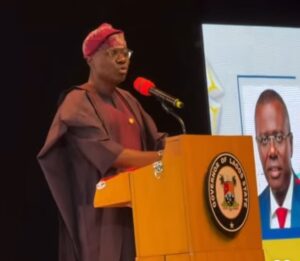 Sanwo-Olu commended FirstBank for its leadership in supporting agriculture and exports, noting that the bank has remained a reliable partner for 130 years. “By backing exports, FirstBank is not only reaffirming its commitment to agriculture but also signaling to farmers, processors, and exporters that they have a dependable ally in building a truly export-driven economy,” he said.
Sanwo-Olu commended FirstBank for its leadership in supporting agriculture and exports, noting that the bank has remained a reliable partner for 130 years. “By backing exports, FirstBank is not only reaffirming its commitment to agriculture but also signaling to farmers, processors, and exporters that they have a dependable ally in building a truly export-driven economy,” he said.
The governor warned that the global marketplace will not wait for Nigeria. “We must aggressively position our agricultural products, secure our market share, and drive investment into agribusiness. To take our rightful place, Nigeria must be intentional, strategic, and relentless in pursuing non-oil export growth,” he said.
 Sanwo-Olu stressed that export initiatives must have tangible impacts, such as increased visibility of Nigerian goods globally, job creation, foreign exchange earnings, and enhanced prosperity for citizens. He reaffirmed Lagos State’s commitment to fostering agribusiness growth, viewing it as a crucial pathway to sustainable development, food security, and inclusive economic growth.
Sanwo-Olu stressed that export initiatives must have tangible impacts, such as increased visibility of Nigerian goods globally, job creation, foreign exchange earnings, and enhanced prosperity for citizens. He reaffirmed Lagos State’s commitment to fostering agribusiness growth, viewing it as a crucial pathway to sustainable development, food security, and inclusive economic growth.

 Business5 years ago
Business5 years ago
 News6 years ago
News6 years ago
 Crime2 years ago
Crime2 years ago
 News1 year ago
News1 year ago
 News5 years ago
News5 years ago
 Football6 years ago
Football6 years ago

 He revealed, “Agriculture already contributes 25 percent to GDP and employs 35 percent of the workforce, with 85 million hectares of arable land and a youth population where 70 percent are under 30,” the minister said. “Yet, Nigeria accounts for less than 0.5 percent of global agricultural exports.”
He revealed, “Agriculture already contributes 25 percent to GDP and employs 35 percent of the workforce, with 85 million hectares of arable land and a youth population where 70 percent are under 30,” the minister said. “Yet, Nigeria accounts for less than 0.5 percent of global agricultural exports.” Kyari submitted that the real challenge is not the absence of resources, but the absence of finance structures that work for farmers. He criticized conventional credit systems that “subjugate rather than support farmers,” and called for new mechanisms such as revenue-sharing finance, agricultural boards with performance triggers, factoring forward contracts, pay-as-you-harvest schemes, and equity-based models.
Kyari submitted that the real challenge is not the absence of resources, but the absence of finance structures that work for farmers. He criticized conventional credit systems that “subjugate rather than support farmers,” and called for new mechanisms such as revenue-sharing finance, agricultural boards with performance triggers, factoring forward contracts, pay-as-you-harvest schemes, and equity-based models. “These uncomfortable comparisons remind us that Nigeria can and must do more,” he said.
“These uncomfortable comparisons remind us that Nigeria can and must do more,” he said. “Oil once gave us a cushion, but it also bred complacency. The fundamentals now compel us to move from dependence on oil to resilience in food and export earnings,” he said.
“Oil once gave us a cushion, but it also bred complacency. The fundamentals now compel us to move from dependence on oil to resilience in food and export earnings,” he said. Alebiosu explained that the sessions were designed to spark robust dialogue, share tested approaches, and generate actionable insights capable of advancing Nigeria’s non-oil economy.
Alebiosu explained that the sessions were designed to spark robust dialogue, share tested approaches, and generate actionable insights capable of advancing Nigeria’s non-oil economy.
 Sanwo-Olu commended FirstBank for its leadership in supporting agriculture and exports, noting that the bank has remained a reliable partner for 130 years. “By backing exports, FirstBank is not only reaffirming its commitment to agriculture but also signaling to farmers, processors, and exporters that they have a dependable ally in building a truly export-driven economy,” he said.
Sanwo-Olu commended FirstBank for its leadership in supporting agriculture and exports, noting that the bank has remained a reliable partner for 130 years. “By backing exports, FirstBank is not only reaffirming its commitment to agriculture but also signaling to farmers, processors, and exporters that they have a dependable ally in building a truly export-driven economy,” he said. Sanwo-Olu stressed that export initiatives must have tangible impacts, such as increased visibility of Nigerian goods globally, job creation, foreign exchange earnings, and enhanced prosperity for citizens. He reaffirmed Lagos State’s commitment to fostering agribusiness growth, viewing it as a crucial pathway to sustainable development, food security, and inclusive economic growth.
Sanwo-Olu stressed that export initiatives must have tangible impacts, such as increased visibility of Nigerian goods globally, job creation, foreign exchange earnings, and enhanced prosperity for citizens. He reaffirmed Lagos State’s commitment to fostering agribusiness growth, viewing it as a crucial pathway to sustainable development, food security, and inclusive economic growth.
